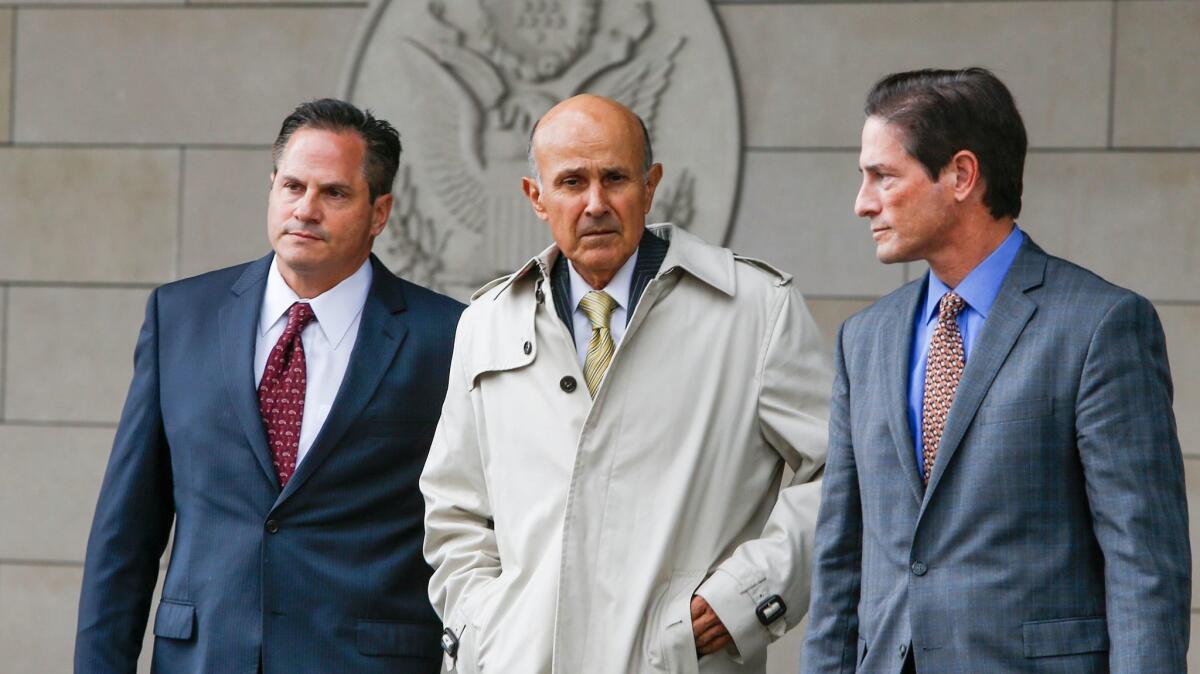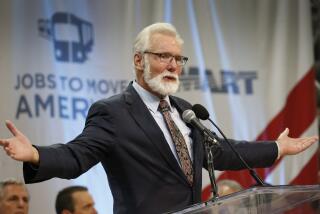Federal prosecutors to retry ex-L.A. Sheriff Lee Baca in obstruction of justice case

- Share via
Federal prosecutors announced Tuesday that they will retry former Los Angeles County Sheriff Lee Baca following a recent mistrial in which a jury nearly cleared him of obstructing an FBI investigation into the county’s jails.
The judge in the case also granted a request by the U.S. attorney’s office to allow prosecutors to include the charge of making false statements to federal authorities in the retrial. U.S. District Judge Percy Anderson previously split that charge from the obstruction and conspiracy charges Baca faced at trial last month.
During the two-week trial, prosecutors from the U.S. attorney’s office tried to convince jurors that Baca had played a central role in a scheme carried out by a group of subordinates to thwart an FBI investigation into abuses and corruption by sheriff’s deputies working as jailers. Baca’s lawyers countered he had been unaware of the ploy unfolding beneath him.
The panel deliberated for days, with all but one of the 12 jurors ultimately voting to acquit Baca. After the panel announced it was deadlocked, Anderson declared the mistrial.
A spokesman for the U.S. attorney declined to comment on the decision to press ahead with another trial after the near acquittal. Baca’s attorney, Nathan Hochman, said, “The government will make its decisions based on whatever calculations it wants to make. Traditionally, many 11-to-1 cases haven’t been retried.”
The retrial is scheduled to begin Feb. 21.
Although it offered only a momentary reprieve for Baca, the verdict dealt a setback for U.S. Atty. Eileen M. Decker and the prosecutors from her office’s Public Corruption and Civil Rights Section that pursued the 74-year-old former sheriff.
Before leveling charges against Baca, Assistant U.S. Atty. Brandon Fox, who heads the anti-corruption unit, had methodically worked his way through the group of rank-and-file deputies and supervisors who were accused of having roles in the obstruction effort. In all, nine people have been convicted or pleaded guilty, including former Undersheriff Paul Tanaka, who ran much of the sprawling agency’s day-to-day operations and was accused of spearheading the campaign to derail the FBI jail investigation.
At last month’s trial, Fox attempted to show that Baca was the “heartbeat” of the obstruction operation and had kept abreast of the effort as it unfolded over six weeks in 2011. The prosecutor argued that deputies carried out orders to conceal from agents the whereabouts of an inmate who was working as an informant, pressured other deputies not to cooperate with the inquiry and tried to intimidate the lead FBI agent by threatening her with arrest.
Few of the government’s witnesses, however, testified to direct interactions with Baca during the time of the alleged obstruction, and there was less hard evidence that implicated the former sheriff than his underlings. Jurors, except for the lone holdout, believed the case was weak and circumstantial.
Fox and Decker had tried to avoid taking Baca to trial, opting instead to strike a plea deal with him early last year that called for Baca to admit to a less serious charge of making false statements to federal investigators during an interview. In exchange, Baca would serve no more than six months in prison.
Anderson, who had handed down stiff sentences in the previous trials, rejected the deal as too lenient and made clear he intended to sentence Baca to significantly more time behind bars. Baca chose to withdraw his guilty plea and take his chances at a trial.
In trying to convince Anderson that the deal was appropriate, Fox acknowledged in court papers that the government’s case against Baca was weaker than the one against Tanaka and more circumstantial.
Despite that assessment and the lopsided jury in the first trial, it was not surprising the government opted to press ahead with a retrial, legal experts said.
Miriam Krinsky, a former federal prosecutor who led a commission on violence in the county jails and who has closely followed the trial, said the U.S. attorney’s aggressive prosecutions of the lower level sheriff’s officials meant there was little choice but to keep the pressure on Baca.
“Fairness and equity demanded them to give it another go,” she said.
And attorney Ken Julian, another former assistant U.S. attorney who prosecuted former Orange County Sheriff Michael Carona on corruption charges, said it would have been unusual if Decker had backed off.
“The U.S. attorney’s approach to the high-level public officials has always been to go after them hard,” Julian said. “So on that level, it is not a surprise they are taking another shot at him.”
Heading in to the first trial, Baca, who is in the early stages of Alzheimer’s disease, faced a charge of making false statements to investigators — the charge to which he had pleaded guilty — as well as the conspiracy and obstruction charges. Baca’s attorney, Nathan Hochman, announced that he planned to use Baca’s deteriorating mind as a defense against the lying charge.
That led the judge to raise concerns that jurors’ view of Baca would be unduly tainted by testimony about the disease. At the judge’s urging, prosecutors moved to divide the case and have a separate jury decide later on the false statements charge.
Although the decision kept any mention of Baca’s illness out of the trial, it also prevented prosecutors from making the case to jurors that Baca lied to investigators to cover up obstruction efforts.
Those restrictions had hamstrung the government’s case, Fox said Tuesday as he asked Anderson to include the false statement charge in the retrial. The judge readily granted the request.
Although he had initially been opposed to the idea of severing the lying charge, Hochman on Tuesday tried to persuade Anderson not to rejoin the charges in a single trial. He told the judge the government was making the move purely for “strategic reasons” and was acting in bad faith. Anderson cut the attorney off, saying, “The matter is closed.”
Hochman’s objections were strategic as well. During the first trial, he successfully hammered on the idea that Baca was a transparent leader as sheriff with nothing to hide from federal investigators. That argument will be more difficult to make in the face of the lying charge.
For more news on federal courts in Southern California, follow me on Twitter: @joelrubin
ALSO
The Baca mistrial explained: What you need to know about the former sheriff’s case
From celebrated lawman to disgraced defendant: Lee Baca faces jury in L.A. corruption trial
Editorial: Lee Baca’s trials aren’t over yet
UPDATES:
6 p.m.: This article was updated with additional details about Tuesday’s court hearing and background about the case.
12:40 p.m.: This article was updated with the court announcement that federal prosecutors plan to retry Baca.
This article was originally published at 6:40 a.m.
More to Read
Sign up for Essential California
The most important California stories and recommendations in your inbox every morning.
You may occasionally receive promotional content from the Los Angeles Times.











